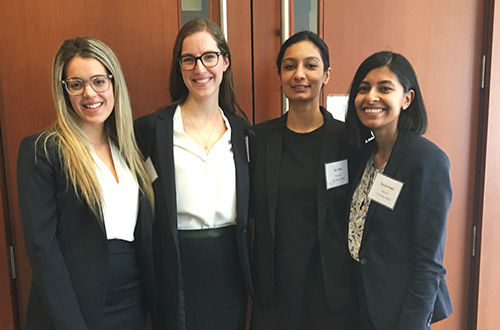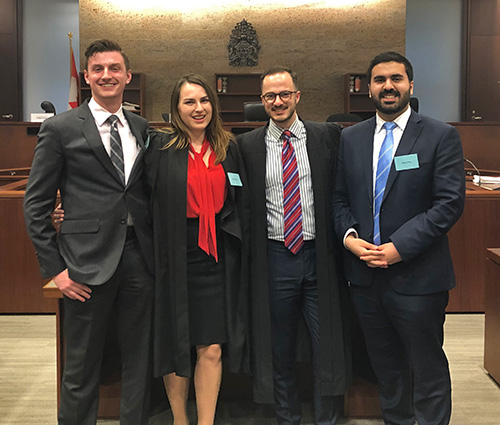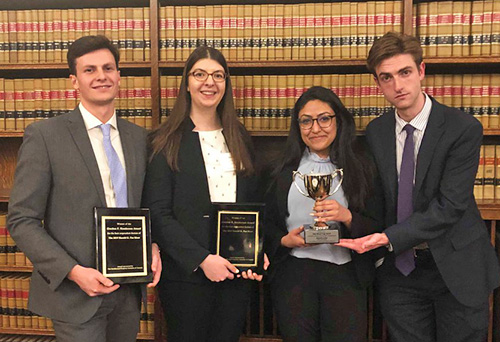As always, the U of T moot teams worked hard and did the school proud in this year's mooting competitions, bringing home wins and many awards for their oral presentations and factums.
Here are the results of the 2019 Mooting competitions:
Jessup Moot
This year's Jessup Moot involved a complex, challenging dispute before the International Court of Justice between two fictional states. The issues included state responsibility over multinational corporations, international environmental law related to the conservation of endangered migratory species, the extraterritorial application of human rights law, and the appropriation of traditional knowledge belonging to indigenous groups.
It is no exaggeration to say that the team, including Will Eberlee, Jeremy Greenberg, Spence Colburn and Calum Agnew performed spectacularly at the Canadian National Rounds. They received the following awards:
- National Champions, meaning that the mooters were Canada's flag-bearers at the international rounds in April.
- Best Aggregate Memorials, meaning that they received the highest aggregate score on their two memorials (facta), in addition to Best Applicant Memorial (tied with McGill) and Best Respondent Memorial.
- Spence Colburn was named Best Oralist, and Will Eberlee was named 7th Best Oralist. We are told that Spence set a record for the highest scores an oralist has received at the Canadian National Rounds in at least a decade, maybe ever.
The Canadian National Rounds took place in Vancouver, followed by the international rounds in Washington, DC. With respect to the team’s performance in Washington, they competed against a fierce slate of competitors from Pakistan, Malaysia, Singapore, and the University for Peace, a UN-established university dedicated to peace studies and based in Costa Rica. Although the team did not advance to the playoff rounds, they put forth some of their best-ever mooting performances. It was an incredible culmination of over six months of hard work, and the team is extremely grateful for the extraordinary support they received from student coaches Daniel Sisgoreo and Sarah Strban, and from faculty advisors Maureen Whelton (Stevenson Whelton) and Professor Jutta Brunnée.
Gale Cup
The University of Toronto also had another wonderful year at the Gale Cup competition, represented by James Aston, Kenzie Bunting, Julie Lowenstein, and Emma Ryman. The problem (based on R v Marakah) asked mooters to make submissions on whether a criminal defendant has a reasonable expectation of privacy in text message conversation recovered on his accomplice’s device and therefore has standing to challenge the search and subsequent admission of evidence.
Kenzie got the Dickson medal for top oralist not in the finals, and Emma and Julie won 2nd place factum, and argued in the finals before Supreme Court of Canada Justice Sheilah Martin. All four did an amazing job and coaches Holly Kallmeyer, Nic Martin, and Devyn Noonan were very proud of them. The team received vital support from adjunct mooting advisors Sinziana Hennig (Stikeman Elliot) and Paul-Erik Veel (Lenczner Slaught.)
Walsh Family Law Moot and Negotiation Competition
The 7th annual Walsh Family Law Moot took place on March 9th at Osgoode Hall. The University of Toronto was well represented by Mark Luimes, Elysia Martini, Emily Fraser, and Glen Tucker. This year’s problem addressed ownership of reproductive materials between a separating couple without a biological connection to the parties. The team all received excellent feedback from their panels of judges, and Emily and Glen won the award for Best Respondent Factum. The team is exceptionally thankful for the assistance and support they received from their coaches Martha McCarthy, Deborah Perkins-Leitman, and Sarah Young (all of Martha McCarthy & Company LLP), and their student coaches Emily Dyer and Jackson Foreman.
On the same day as the Walsh Family Law moot, the organizers have a Negotiation competition. U of T’s team, Jennifer Crawford, Simon Fraser, Justin Irwin, and Jennifer Katz, was equally successful in this context, with Jennifer Katz and Jennifer Crawford winning 3rd place for overall best negotiating teams and Jennifer Katz tying for 1st for overall best individual negotiator. The Adjunct Advisors were Samantha Eisen (Epstein Cole) and Judith Huddart (Dranoff Huddart).
Bowman Tax Moot
Bowman Tax Mooters James Pendergast, Colin Romano, Ian Sinke, and Kees Westland represented the Faculty at the Federal Courts Building in early March. The issues revolved around Section 245’s General Anti-Avoidance Rule, and whether or not taxpayers had abused section 84.1 and subsection 89(1). Our team did a phenomenal job wrestling with a complex transaction that engaged some of the most challenging provisions of the Income Tax Act. The team gave stellar performances and were commended by the Honourable Justice David Stratas (Federal Court of Appeal) for their dynamic mooting style.
The team’s Adjunct Mooting Advisors were Martha MacDonald (Torys) and Al-Nawaz Nanji (Osler). They were also strongly supported by last year’s tax mooters, Mathew Elder and Stephanie D’Amico, who found working with the team thoroughly enjoyable.
Laskin Moot
The University of Toronto’s Laskin Moot team flew to Winnipeg to argue issues of administrative and constitutional law. Competing in both French and English, the team mooted on issues arising from federal regulations and restrictions on the sale of shark fin soup.
Appellants Maura McDowell and Ryan Michael Marinacci (our bilingual mooter) argued for the federal government that the regulations on finning sharks and selling their soup was within federal jurisdiction and delegated authority. Both mooters were applauded by judges for their excellent faculty with the law and strong engagement with the bench. Respondents Jason Lamb and Andy Yu, representing a restaurant owner and shark breeder, argued that the agency unlawfully excluded the Chinese-Canadian community, whose Charter rights were infringed. Jason and Andy also received excellent feedback. Andy, who was ranked among the top 10 oralists, was described by one judge as “the best of the mooters I have seen this year.”
The team was coached by student coaches Becky Lockert and Morag McGreevey, who were endlessly impressed with the mooters’ dedication. The team received vital support from William MacLarkey and Padraic Ryan, both of the Ministry of the Attorney General for Ontario.
Competition Law Moot
Closer to home, Anne Marshall, Eric Shoemaker, Matthew Prior, and Kate Somers participated in the 1st Annual Competition Law Moot. The moot was co-hosted by the Competition Bureau, the Competition Tribunal, and the Canadian Bar Association and took place at the Federal Court of Canada. Mooters made written and oral submissions in the appeal of a fictional Competition Tribunal decision regarding a merger challenge under section 92 of the Competition Act. Mooters from five Canadian law schools were judged by an Alberta Court of Appeal justice, the Chairperson of the Competition Tribunal, the Chief Justice of the Federal Court of Canada and former Supreme Court of Canada justice, the Honourable Marshall Rothstein. Anne and Eric took home Top Appellant Team and Anne took home Top Appellant Oralist.
The student coaches, David Rybak and Robin Spillette, were ably aided and abetted by adjunct mooting advisors Mike Laskey (Stikeman Elliot) and Nathaniel Read-Ellis (Adair Goldblatt).
Wilson Moot
The University of Toronto’s Mariangela Asturi, Eileen Church Carson, Su Rao, and Sonia Patel faced tough competition in the Wilson Moot arguing a problem that focused on a Charter claim of discrimination in the government funding of a program for assisted human reproduction in Saskatchewan. Faculty mooting coaches, Joseph Cheng (MAG), Cheryl Milne (Asper Centre) and Professor Lorraine Weinrib found the problem an interesting challenge. The mooters and advisors are especially grateful to student coaches Meena Sundararaj, Julia Kirby, Ritika Rai and Hayley Goldfarb for their hard work in supporting the team. This year the Wilson trophy will be leaving Canada as the team from Bond University took first place in the competition in front of a panel of judges including Justice Suzanne Côté of the Supreme Court of Canada, Justice Ritu Khullar of the Alberta Court of Appeal and Justice Michal Fairburn of the Ontario Superior Court of Justice.

The Wilson Moot team, 2019: Mariangela Asturi, Eileen Church Carson, Su Rao and Sonia Patel
Willms & Shier Environmental Law Moot
The U of T team in this year’s Willms & Shier Environmental Law Moot argued the complicated question of whether provincial legislation requiring participants in the oil and gas industry to conduct environmental remediation work conflicted with the scheme of priorities set out in the Bankruptcy and Insolvency Act. The moot problem was an appeal of a real-life Alberta Court of Appeal case: Orphan Well Assn. v. Grant Thornton Ltd., 2017 ABCA 124. The problem became even more complicated when, a few weeks before the competition, the SCC released its decision on the matter, reversing the Alberta Court of Appeal’s holding. The teams skillfully weaved the Supreme Court’s decision into their oral arguments, treating it as an influential but non-binding advisory opinion. Darren Marr, Xiaoya Qiu, and Lauren Rainsford advanced to the finals, mooting against a strong University of Saskatchewan team. The final bench consisted of Justice Côté of the Supreme Court of Canada, Justice Gleason of the Federal Court of Appeal, and Justice van Rensburg of the Court of Appeal for Ontario.
Our team performed immensely well throughout the competition. They demonstrated an impressive grasp of a difficult problem and placed second overall in the competition. Lauren was one of seven distinguished oralists, and Darren earned the award for first place oralist. The team was capably supported by student coaches Hayley Goldfarb (again!) and Louell Taye, and received invaluable assistance from faculty advisor Laura Bowman (Ecojustice).
Warren K. Winkler Class Actions Moot
On February 23rd, Sarah Helmer, Aylin Manduric, Paul Sahota, and Hanna Singer participated in the 6th Annual Warren K. Winkler Class Actions Moot, hosted by McCarthy Tétrault. Through two preliminary rounds, the mooters argued a complex certification motion for an environmental class action concerning emissions from a spice factory. The Plaintiff team (Sarah and Paul) advanced to the finals and made submissions before a panel consisting of Chief Justice Warren Winkler (formerly of the Ontario Court of Appeal), Justice Benjamin Zarnett (Ontario Court of Appeal) and Erica Baron (McCarthy Tétrault). In their feedback, the judges praised Sarah and Paul for their excellent advocacy and remarked that it far exceeded their expectations. For her performance, Sarah received the award for Third-Place oralist. The Defendant team (Aylin and Hanna) also had an excellent showing, winning praise from the judges for their strong grasp of the motion record and for writing the Second-Place Defendant factum. For her performance, Aylin also received the award for Second-Place oralist. Overall, the team had an exceptional showing. Their student coaches, Andrew Basso, Brenda Chang, Albert Kwan, and Andrew Sahai, and the mooting advisors, Cheryl Woodin (Bennett Jones) and Simon Stern, thoroughly enjoyed working with the team and are extremely proud.
Callaghan Memorial Moot
Following are the results for the 2019 Callaghan Memorial Moot (the law school's internal moot): Respondents Jacob Eidinger and Melanie Zetusian were the winners of the Callaghan, facing Appellants Eli Bordman and Catherine MacIsaac in the finals. The top three oralists were Ioana Dragalin (1st place), Jacob Eidinger (2nd place), and Omar Said (3rd place). Factum awards went to Appellants Alysa Holmes and Ioana Dragalin and Respondents Justin Lee and Nicole Thompson. John Aziz, Anastasia Grigoriou, Olivia Hodson, Jacob Millns, Leslie Anne St. Amour, Madeline Torrie, and Kiran Waterhouse also crafted written and oral arguments about the constitutionality of a backyard search in a housing co-operative. At issue was whether the police's search constituted a breach of the accused’s s. 8 and s. 9 Charter rights, and whether the firearm and drugs found in the accused’s backpack should be excluded under s. 24(2). None of this could have happened without hard work and enormous time commitments from Chief Justices Josh Favel, Wendes Keung, and Tim Shin, and the continuing support of Professor Hamish Stewart. Congratulations to all on another great year in the Callaghan!
Davies' Corporate/Securities Law Moot
The University of Toronto won the 2019 Davies' Corporate/Securities Law Moot. This year's moot related to complex securities law issues in the emerging recreational cannabis industry. The team, consisting of Tom Feore, Daryna Kutsyna, Hesam Wafaei, and Tom Collins went 4-0 in the preliminary rounds, finishing as the top team going into the finals round. They beat Osgoode in the finals to win the entire tournament, with Daryna also finishing as the tournament's top speaker. The team also took home the award for 3rd place factum.
The team was coached by student coaches Chris Puskas, Adil Abdulla, Dylan Marrello, and Shaan Tolani. The mooters received invaluable support from McCarthy Tétrault and in particular from Shane D'Souza, Andrew Matheson, and Simon Cameron. The team also received instrumental support from Professor Anita Anand. While the coaches are thrilled with the victory, they are not surprised - the team worked exceptionally hard and the victory is well deserved.

The 2019 Davies Moot team: Tom Feore, Daryna Kutsyna, Tom Collins, and Hesam Wafaei
Kawaskimhon Moot
The Kawaskimhon Moot took place from February 28th to March 3rd in Halifax. The University of Toronto was effectively represented by third year students Zach Biech, Natalie Day, Wanekia (Kia) Dunn, Veronica Guido, and Catherine Ma. The teams negotiated with other Indigenous and advocate parties regarding the issue of Indigenous child welfare. Specifically, the teams had to consider legal mechanisms to enforce the Crown’s obligations to support equitable and culturally appropriate child welfare services to Indigenous nations, as well as suggest long-term reforms to the child welfare system itself.
The Kawaskimhon Moot is a consensus-based moot, so there are not winners, losers, and individual awards. The teams from the University of Toronto took a leading role and contributed substantially to the ultimate proposals at their tables. Their position papers went to Dr. Cindy Blackstock, informing future litigation and strategies to improve the welfare of Indigenous children.
The team is grateful to Professor Douglas Sanderson, Bryce Edwards (Olthuis Kleer Townshend), and others from OKT Law for providing coaching support.
Harold G. Fox Intellectual Property Moot
Congratulations to Aya Schechner, Dan Poliwoda, Thoby King, and Mehak Kawatra, who competed in and won the Harold G. Fox Intellectual Property Moot on February 22nd and 23rd. Dan and Aya won Best Respondent Factum and finished first overall. Mehak and Thoby won runner-up for the Best Appellant Factum.
This year’s problem explored the scope of copyright protection for works arising from a natural process, and the overlap between copyright and industrial design. In the finals, Dan and Aya appeared before the Honourable Justice Rowe of the Supreme Court of Canada, the Honourable Justice Gauthier of the Federal Court of Appeal, the Honourable Justice Feldman of the Ontario Court of Appeal, the Honourable Justice Roberts of the Ontario Court of Appeal, and the Honourable Justice Manson of the Federal Court. The bench was very impressed by the oral advocacy skills of the finalists, commenting that they forgot the mooters were students and not lawyers.
The team is tremendously grateful for the support and mentorship provided by Adjunct Moot Advisors, Andy Shaughnessy (Torys) and Dominique Hussey (Bennett Jones), and by student coaches, Jacquelyn Smalley and Arron Chahal.

The Fox Moot team, L-R: Dan Poliwoda, Aya Schechner, Mehak Kawatra, Thoby King
Arnup Cup
Warm compliments to Kennedy Sampson and Andrew Basso, who showed their trial advocacy skills in the Arnup Cup on February 8th. The comments they received from the judge and assessors were very positive. Their cross-examinations were especially effective and the Judge praised them for their skillful and correct use of the witness’ prior inconsistent statements as well as their courtroom manners more generally. Andrew and Kennedy were coached by Cooper, Sandler and Shime’s Jonathan Shime and Megan Schwartzentruber.
Isaac Diversity Moot
This year was another strong year for the Isaac Diversity Moot. The UofT Law team came in second overall, and we took home the best oralist prize. The Respondents (Angela Hou and Josh Foster) made a compelling case for a deferential and principled judicial review of a BCHRT decision - and narrowly lost to McGill Law in the finals. In their comments, the judges highlighted Angela's masterful discussion of intersectionality, and Josh's strong grasp of the relevant law. The Applicants (Kristin Marks and Nargis Fazli) also performed a stirring job with judges commending them on their careful use of the equities, and strength answering the benches' questions. Josh Foster also took home the best oralist for a performance which the bench described as "just excellent." The team received massive support from student coaches Sol McKenzie, Lynn Tay, Guarav Gopinath, and Tina Cody; and adjunct mooting advisor, MAG’s Joseph Cheng (Justice). Joseph told us that all of the mooters did a “simply brilliant job this year and the faculty should be proud.” We are!
Canadian Labour Arbitration Competition
In the Canadian Labour Arbitration Competition, Daniel Moon and Shimon Sherrington argued in two arduous rounds at the Ontario Labour Relations Board on January 26th. The problem this year involved a complicated instance of workplace sexual harassment. Arguing for the employer in the morning and the union in the afternoon, Shimon and Daniel delivered compelling, nuanced arguments regarding how the law ought to define sexual harassment in the post-#metoo era and how employers should conduct impartial workplace investigations. As well as delivering clear, persuasive submissions on these complex, delicate issues, Daniel and Shimon responded calmly and powerfully to the vigorous questioning they received from the two panels of labour experts they mooted before. In their first round, Shimon and Daniel relied heavily on a case that was decided by one of their panelists. When that panelist revealed some surprising background information about the case, the team seamlessly wove the new facts into their arguments. Overall, the team's performance was outstanding. Their student coaches, Lily Hassall and Rachel Chan, together with adjunct mooting advisors Maeve Biggar (Caley Wray LLP) and Kathryn Bird (Hicks Morley LLP), loved working with Shimon and Daniel and were deeply impressed by their work ethic and determination.
Jessup Moot



